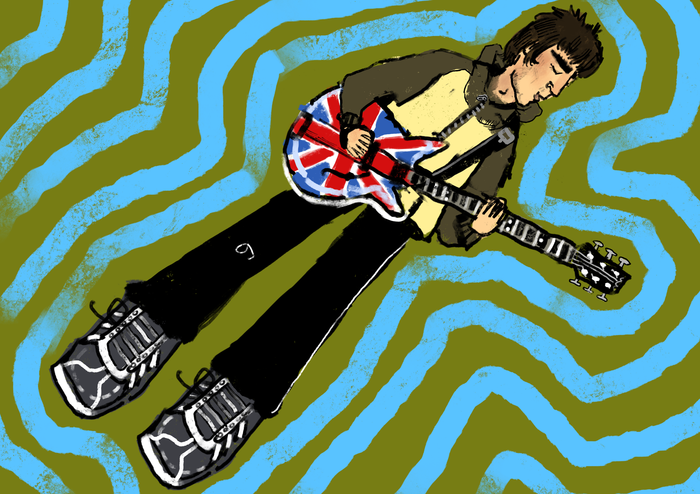Quick, cut the cameras! Crossing the lines of free speech onstage
Francis McCabe takes a look back at the BBC’s livestream of Glastonbury 2025, and considers the performances of KNEECAP and Bob Vylan

Three pixels in the last ten minutes. Many young students, whether music-inclined or just set on a good time, shared this same first-world problem moment. The early 8am rise to a drearily grey Cambridge in mid-November, only to enter the interminable (and ultimately unsuccessful) queue for Glastonbury 2025 tickets.
Unlucky this year, I was determined not to miss out. Fresh out of May Week, many people, like me, may have looked forward to the moment of sinking into the sofa, pawing through the backlogs of BBC iPlayer and exploring the highlights of Glastonbury through the TV screen. Sure, the sound isn’t the same: but with the added luxuries of a nearby fridge, working showers, and a comfy bed, I was happy to exchange the festival camping experience for a live-streamed and digitised alternative.
Sitting down on the Saturday, I was eager to watch one performance in particular. KNEECAP had been sitting at the top of my list-of-interest ever since they had begun to spread between my Spotify playlists after the release of their 2024 film. I had carved out a special hour today for them in particular – only to discover it hadn’t been recorded. Or it had, but not for my consumption: it had been recorded as a public order incident.
If you’ve been dodging news headlines like they’re the Gardaí, KNEECAP are an Irish hip-hop trio, comprised of Móglaí Bap, Mo Chara and DJ Próvaí: the stage names of Belfast’s Liam Óg Ó hAnnaidh and Naoise Ó Cairealláin and Derry’s favourite ex-music teacher, J.J. Ó Dochartaigh.
Whilst the stage names Mo Chara and Móglaí Bap respectively mean ‘my friend’ and originate from the likeness of Ó Cairealláin’s childhood bowl haircut to The Jungle Book’s Mowgli, DJ Próvaí’s name more divisively stems from the slang ‘Provo’ used to reference members or supporters of the Provisional IRA. The controversy doesn’t stop there. With lyrics in English and Irish, they have become the nucleus for new music pushing the boundaries of modern Irish-language revival, with songs commenting on recreational drug usage, free speech rights, and working-class unity. Set out to be known for exciting music hand-in-hand with a political edge, recently, their fame seems restricted to controversial and condemnatory headlines.
KNEECAP’s Glastonbury set, had been denoted ‘high risk’ by the BBC and not for livestreaming purposes following Mo Chara’s bearing of a Hezbollah flag at one of the band’s gigs in November. Their outspoken publication of Pro-Palestinian messages onstage has awarded them the disapproval of important figures in Irish and UK governments alike: their performance at Coachella even saw objection from the likes of Sharon Osbourne, who called for their US visas to be revoked. The group’s Glastonbury set had been put under investigation by Somerset and Avon police – an inquiry the band labelled an act of ‘political policing intimidation’ – for pro-Palestinian comments made during performance.
Surpassing the scrutiny (and shock factor) of KNEECAP’s Pro-Palestinian commentary are Ipswich’s punk rap duo Bob Vylan, who lead a chant of ‘Death, death to the IDF’ (the Israeli Defence Forces) during their set at Glastonbury. The smaller punk group had not been signalled a risk for broadcasting like the more established trio: concurrently, their performance was livestreamed, and as a result, it was not only the duo that came under fire, but the BBC itself, for not cutting away from its coverage of the set.
Though I had heard of Bob Vylan previously, it was this outspoken stunt that landed them on the frontpage of my daily BBC news doomscroll. It was also this new, controversial presence that took me – along with many others—to their Spotify page to stream a few of their songs. Since their set on the 28th, their Spotify monthly listenership has increased from 220,669 to a whopping 621,354 on the 16th July (according to musicmetricsvault.com). It appears P. T. Barnum’s old adage that ‘there is no such thing as bad publicity’ still holds true.
“P. T. Barnum’s old adage that ‘there is no such thing as bad publicity’ still holds true”
Vylan’s frontman Pascal Robinson-Foster, who led the chant, has since clarified in the face of their consequent media coverage that he was not advocating for “the death of Jews, Arabs or any other race or group of people” but supporting “the dismantling of a violent military machine.” Bob Vylan have become a frontrunning punk voice with a single statement, repeated and chanted back by thousands.
Music has long-since been a form of cultural, personal and political expression. But as the organisers of the festival denounced Vylan that they were “appalled” by their behaviour, which “crossed a line,” questions begin to arise at where the line of free speech and public expression is really drawn.
It’s not just festival organisers, prime ministers, MPs, and members of the public denouncing the behaviour of KNEECAP and Vylan: there’s division between musicians too. Blur and Gorillaz’s Damon Albarn responded to Vylan’s statement, labelling it “one of the most spectacular misfires”. It seems that both Vylan’s violent appeals and Mo Chara’s glorification of Hezbollah do little more than create cultural division among both artists and the public. Rather than unifying the public on the behalf of Palestine, it has rewarded the artists with cancellations of their gigs, restrictions to their tours, and spates of politico-musical infighting to deal with online.
If anything is to be learnt from history, however, it’s that music does have a voice. KNEECAP and Vylan, however appropriate their comments and actions, participate in a culture of musical activism. However they sit on, overtly cross, or redefine the ‘line’ of protest speech, they will share the spotlight of history that has stage-lit past performances of protest: Dominic Behan’s ‘Rifles of the I.R.A.’ for Irish Independence or Bob Dylan’s ‘The Times They Are A-Changin’ for Vietnam; Billy Bragg’s ‘Between the Wars’ for Britain’s Miners’ Strikes or The Specials’ ‘Ghost Town’ against destitution in Thatcher’s Britain; or N.W.A.’s ‘F*ck tha Police’ against racially biased police brutality are to name but a few.
“Music does have a voice”
On the 19th of July, Vylan hit back at Albarn on X/Twitter, naming him an “out of touch ’90s musician”: the rest of Vylan’s response is sharp, serrated, and cuts straight to the bone.
While the investigation into KNEECAP has since been dropped on grounds of insufficient evidence, Vylan’s set is still under examination. As the world slowly approaches a full two years since the start of the conflict, Vylan asks “Why are we talking about a punk band?”: music’s power for political activism certainly remains alive, but as it approaches the threshold of inciting political violence, regardless of clarified intention, can we really chant along?
The roots of activism lay in tireless campaign for social and political change: increasingly radical and violent appeals not only risk estranging voices from the debate but betraying the very origins of activism, losing sight of campaigning for what is right. Casting our eyes out into the long, vivid history of politically charged music, activism driven by social and political anger should be easily discernible from that fuelled by hate. Though it will always have a place in music of the past, present and future, only time will tell whether we reflect back upon the instances of musical activism of today with pride in standing for what is right, or with regret in that we let ourselves be led astray with appeals for violence as opposed to dialogue.
 News / Deborah Prentice overtaken as highest-paid Russell Group VC2 February 2026
News / Deborah Prentice overtaken as highest-paid Russell Group VC2 February 2026 News / Christ’s announces toned-down ‘soirée’ in place of May Ball3 February 2026
News / Christ’s announces toned-down ‘soirée’ in place of May Ball3 February 2026 Fashion / A guide to Cambridge’s second-hand scene2 February 2026
Fashion / A guide to Cambridge’s second-hand scene2 February 2026 News / Downing Bar dodges college takeover31 January 2026
News / Downing Bar dodges college takeover31 January 2026 Comment / Men at Cambridge are experiencing equality2 February 2026
Comment / Men at Cambridge are experiencing equality2 February 2026










